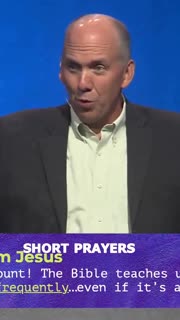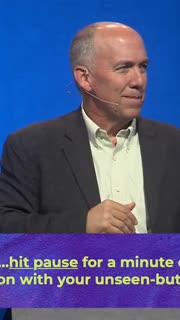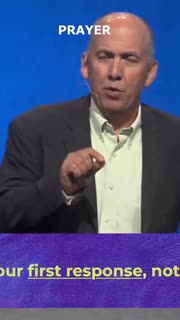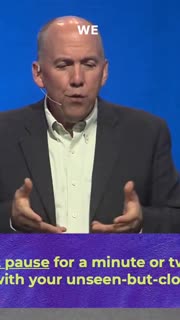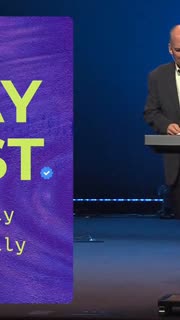Transformative Power of Relational Prayer
Devotional
Sermon Summary
Bible Study Guide
Sermon Clips
### Quotes for Outreach
1. "Short prayers count. The Bible says, The Bible teaches that it's better to pray frequently, even if it's a brief prayer, that this can be powerful. And it's possible because of this. Jesus says, Your Father in heaven knows what you need when? Even before you ask Him." ([44:51] (18 seconds)
)
2. "Imagine, imagine the wisdom and the strength and the patience and the peace that might be yours if you engaged with your Father that many times a day. Imagine how much you would honor the Lord as you asked him for direction. We say acknowledge the Lord in all your ways and he will what? He will direct your paths, right?" ([48:08] (26 seconds)
)
3. "Make prayer your first response, not your last resort. Would you say that with me here? Make prayer your first response, not your last resort. What do you think that does to the heart of a father?" ([58:27] (16 seconds)
)
4. "Jesus says the secret to answer prayer is not begging and pleading. My son didn't come to me and go, Dad, I beseech you. Could you find it in your schedule? Just two minutes, Father. Please, please, I'm begging you to help me with the budget. Right? You'd go, what kind of relationship does he have with you?" ([59:32] (23 seconds)
)
5. "Jesus says in Matthew 7, he goes, keep on asking. Keep on knocking. Keep on seeking. He's always attentive. He's going to be with you every moment of today and tomorrow and the next day. And I wonder if sometimes, sometimes he's going, I wonder why she doesn't come to me. I wonder why he doesn't talk to me at all through the day. Except when there's a major crisis." ([01:01:09] (28 seconds)
)
### Quotes for Members
1. "A while back, we did a survey at Grace, and we asked people questions about prayer, and hundreds participated. There were really encouraging aspects, data that we were like, that's good, and there were some signs of common struggles." ([37:47] (24 seconds)
)
2. "The most likely area that I often hear is people go like, I wish I did better. Better like in praying. I wish I'm more consistent. I wish I just talked to God more. And so this is a place where a lot of Christians feel guilty. And if that describes you, let me just tell you this. Welcome to the club, all right? You're not alone. Definitely not alone." ([39:24] (23 seconds)
)
3. "My goal today is not for you to feel more guilty as you walk. God, you're like, man, I really am a failure at this. Instead, what I'd like to do is, I would like to approach prayer in a relational way, to invite you into something where I believe that if you could leave today saying, wow, I can have this ongoing conversation with the person who is always with me and cares about me more than I could ever comprehend." ([41:08] (30 seconds)
)
4. "What if we pressed the pause button 10, 25, 50 times a day and just had a quick interaction with the one who's with us, our invisible but always present companion. Imagine, imagine the wisdom and the strength and the patience and the peace that might be yours if you engaged with your Father that many times a day." ([47:28] (30 seconds)
)
5. "Friends, wow, what if we saw prayer as an invitation? You know the verses I mentioned earlier? What if I said, like, we get to pray continually, right? It's not meant to be a burden. I get to talk to my friends, my father in heaven who, how much more will he respond to me if I'm good and I'm a, you know, he says, I've got some brokenness in my life and I love to respond to my children. How much more?" ([01:03:40] (32 seconds)
)
Ask a question about this sermon
1. "Short prayers count. The Bible says, The Bible teaches that it's better to pray frequently, even if it's a brief prayer, that this can be powerful. And it's possible because of this. Jesus says, Your Father in heaven knows what you need when? Even before you ask Him." ([44:51] (18 seconds)
)
2. "Imagine, imagine the wisdom and the strength and the patience and the peace that might be yours if you engaged with your Father that many times a day. Imagine how much you would honor the Lord as you asked him for direction. We say acknowledge the Lord in all your ways and he will what? He will direct your paths, right?" ([48:08] (26 seconds)
)
3. "Make prayer your first response, not your last resort. Would you say that with me here? Make prayer your first response, not your last resort. What do you think that does to the heart of a father?" ([58:27] (16 seconds)
)
4. "Jesus says the secret to answer prayer is not begging and pleading. My son didn't come to me and go, Dad, I beseech you. Could you find it in your schedule? Just two minutes, Father. Please, please, I'm begging you to help me with the budget. Right? You'd go, what kind of relationship does he have with you?" ([59:32] (23 seconds)
)
5. "Jesus says in Matthew 7, he goes, keep on asking. Keep on knocking. Keep on seeking. He's always attentive. He's going to be with you every moment of today and tomorrow and the next day. And I wonder if sometimes, sometimes he's going, I wonder why she doesn't come to me. I wonder why he doesn't talk to me at all through the day. Except when there's a major crisis." ([01:01:09] (28 seconds)
)
### Quotes for Members
1. "A while back, we did a survey at Grace, and we asked people questions about prayer, and hundreds participated. There were really encouraging aspects, data that we were like, that's good, and there were some signs of common struggles." ([37:47] (24 seconds)
)
2. "The most likely area that I often hear is people go like, I wish I did better. Better like in praying. I wish I'm more consistent. I wish I just talked to God more. And so this is a place where a lot of Christians feel guilty. And if that describes you, let me just tell you this. Welcome to the club, all right? You're not alone. Definitely not alone." ([39:24] (23 seconds)
)
3. "My goal today is not for you to feel more guilty as you walk. God, you're like, man, I really am a failure at this. Instead, what I'd like to do is, I would like to approach prayer in a relational way, to invite you into something where I believe that if you could leave today saying, wow, I can have this ongoing conversation with the person who is always with me and cares about me more than I could ever comprehend." ([41:08] (30 seconds)
)
4. "What if we pressed the pause button 10, 25, 50 times a day and just had a quick interaction with the one who's with us, our invisible but always present companion. Imagine, imagine the wisdom and the strength and the patience and the peace that might be yours if you engaged with your Father that many times a day." ([47:28] (30 seconds)
)
5. "Friends, wow, what if we saw prayer as an invitation? You know the verses I mentioned earlier? What if I said, like, we get to pray continually, right? It's not meant to be a burden. I get to talk to my friends, my father in heaven who, how much more will he respond to me if I'm good and I'm a, you know, he says, I've got some brokenness in my life and I love to respond to my children. How much more?" ([01:03:40] (32 seconds)
)
